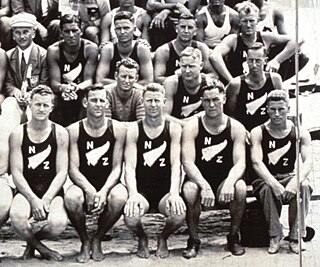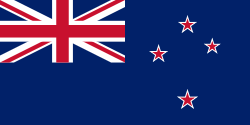Top Qs
Timeline
Chat
Perspective
New Zealand at the Olympics
Sporting event delegation From Wikipedia, the free encyclopedia
Remove ads
New Zealand first sent an independent team to the Olympics in 1920. Before this, at the 1908 and 1912 Summer Olympics, New Zealand and Australian athletes competed together in a combined Australasia team. New Zealand has also participated in most Winter Olympic Games since 1952, missing only the 1956 and 1964 Games.

The New Zealand Olympic Committee (NZOC) is the National Olympic Committee for New Zealand. The NZOC was founded in 1911, and recognised by the IOC in 1919.
New Zealand athletes have won a total of 163 medals, with 157 won at the Summer Games and six at the Winter Games. The most successful sport has been rowing with 33 medals, with athletics second with 28 medals. Before the 2022 Winter Olympics, the 140 medals won by New Zealand put the country at number 32 on the all-time Olympic Games medal table for total number of medals and number 24 when weighted by medal type.
Following the 2020 Summer Olympics, 1519 competitors represented New Zealand at the Olympic Games. Harry Kerr is considered[1] the first Kiwi Olympian[2] and Adrian Blincoe the 1000th.[3] On 11 June 2009 it was reported that of the 1111 Olympians to that date, 114 were deceased and the whereabouts of 21 were unknown.[3] By 25 June 2009, only 9 Olympians had not been located.[4] There are no living Kiwi Olympians from before the 1956 Olympics in Melbourne.[3][5]
Remove ads
New Zealand at the Summer Games
Summarize
Perspective
The first person from New Zealand to compete at the Olympic Games was Victor Lindberg, who was a member of the Osborne Swimming Club, which represented Great Britain in water polo at the 1900 Summer Olympics and won gold.
Three New Zealanders won medals competing for Australasian teams in 1908 and 1912. New Zealand sent its first independent team to the VII Olympiad in 1920, comprising two runners, a rower, and a 15-year-old swimmer.
Due to its location in the South Pacific and distance from the early Olympic host cities in Europe and North America, New Zealanders needed to undertake long sea voyages to participate. Since the advent of international jet air travel in the 1950s, and the greater number of Olympic sports, the size of New Zealand Olympic teams has increased substantially. New Zealand, like other Southern Hemisphere countries, has had the disadvantage of needing to peak to compete in summer sports that are held during their winter months. Only three Olympics have been held in the Southern Hemisphere, the 1956 Summer Olympics in Melbourne, the 2000 Summer Olympics in Sydney, and the 2016 Summer Olympics in Rio de Janeiro.
New Zealand's participation in the 1976 Games was controversial, and led to a boycott of the Games by most African countries, who protested against sporting contacts between the All Blacks and apartheid South Africa.
Remove ads
New Zealand at the Winter Games
New Zealand has had a much smaller participation in the Winter Olympics, owing to its oceanic climate and Southern Hemisphere location requiring athletes to peak in the middle of the New Zealand summer. The nation did not assemble its first Winter Olympic team until 1952. In 1988 the team included bobsleighers; the first entry in a winter sport other than alpine skiing.
In 1992, Annelise Coberger of New Zealand became the first person from the Southern Hemisphere to win a medal at the Winter Olympics when she won silver in the slalom at Albertville in France.
In 2018, Zoi Sadowski-Synnott won New Zealand's second Winter Olympic medal in the inaugural big air snowboarding competition in Pyeongchang, South Korea, winning bronze. Later on the same day, 16-year-old Nico Porteous won New Zealand's third Winter Olympic medal in the men's ski halfpipe, also taking bronze.
Four years later in 2022, Zoi Sadowski-Synnott also won New Zealand's first-ever Winter Olympics gold medal, in the women's slopestyle. Nico Porteous later won New Zealand’s second-ever Winter Olympics gold medal, again in the men’s ski half pipe.
Remove ads
Athlete selection and sport funding
Athletes are chosen by the national sporting bodies and nominated to the NZOC for selection. The selection process was overhauled after the disappointing performance at the 2000 Summer Olympics in Sydney, Australia, where the 151 New Zealand athletes returned with just four medals (one gold and three bronze). The NZOC devised rules by which an athlete would only be selected if they had a chance to reach the final 16 in an Olympic competition. It also resulted in an overhaul of the way high-performance sport is funded, with Sport and Recreation New Zealand (SPARC) set up to change from a block funding model to targeted investments. This also forced some sporting bodies to amalgamate as SPARC would only deal with one funding body per sport.[6]
Participation
Timeline of participation
Medal tables
Summarize
Perspective
Remove ads
Summary by sport
Rowing
Sailing
Remove ads
See also
References
External links
Wikiwand - on
Seamless Wikipedia browsing. On steroids.
Remove ads

